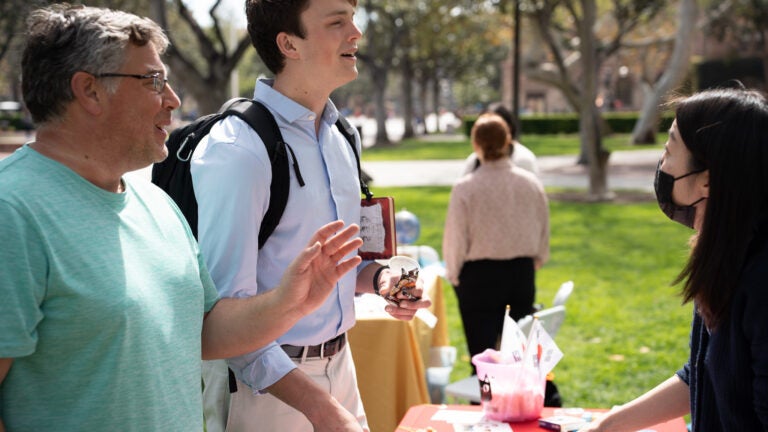
Supporting our Faculty
At CLC, we recognize the importance of continuous professional development for language teachers and strive to provide them with the necessary resources to enhance their skills and knowledge. To achieve this goal, we offer various grants to support language faculty, including funding for attending conferences and workshops, purchasing essential equipment and software for their classrooms, and other related needs. These grants aim to encourage teachers to engage in ongoing learning and stay up-to-date with the latest teaching methodologies and technologies in their field. By investing in our language teachers’ professional development, we aim to enhance the quality of language education for our students and promote a dynamic and innovative learning environment.
Professional Development Grants
The Center for Languages and Cultures is offering a limited number of $500 grants to RTCP faculty members to help them pay for expenses associated with their professional development. The grants may be used for technology purchases, continuing education, research expenses, conference participation (in-person and virtual), or other costs related to professional development.
The selection committee will prioritize applications for those presenting at national conferences (first time attendees will be given additional priority). To be eligible, applicants must be current RTCP Dornsife faculty, and submit a complete application. Grants are awarded once a year.
The application is for the current cycle is closed. The next cycle applications will be due early September, 2024.
Language Teaching Innovation Grants
Language faculty continually explore innovative methods, and adopt state-of-the-art tools so as to hone their teaching practices, thereby invigorating curricula, and their classroom. In order to commend this continuous strive for betterment, the Center for Languages and Cultures is pleased to introduce the Language Teaching Innovation Grants. These grants intend to support USC language faculty as they implement new methodologies, strategies and tools that align with the learning goals of their individual programs. Further, the grants aim at establishing a framework for sharing experiences and findings as aresult of new adoptions.
The overarching goal of the grants is to:
- Incentivize faculty to explore new methods/strategies/tools in language pedagogy;
- Expose students to a broader range of learning opportunities, resources and tools;
- Support and disseminate innovative teaching tools and techniques;
- Develop inter-departmental relationships.
The application is for the current cycle is closed. The next cycle applications will be due early September, 2024.
Past Grant Recipients
-
Fall 2022
Implementing PBL in advanced Chinese course where students select and present authentic materials autonomously, alongside textbook curriculum, constituting 24% of semester grade. Addition of Think-Tac-Toe gamification element in Spring 2023, where students select tasks from a table with input/output types and cultural topics, diversifying task types and meeting individual interests.Watch the presentation of the project:
-
The use of wizer.me was explored to design and share interactive worksheets with Spanish language students in the third and fourth semesters. The app incorporated a variety of text and media in visually stimulating ways, including written and recorded instructions, student recordings, labeled images, and drawings. The tool targeted the acquisition of vocabulary related to health, wellbeing, illness, sports, environment, culture, and politics, with students producing audio, written, and visual texts to appeal to different learning preferences.
Watch the presentation of the project
-
Gameful design was implemented in the past to address learner variability issues in Advanced Chinese language classrooms. This curriculum allowed students to personalize their learning experience by selecting tasks aligned with their goals and accumulate points. Instead of traditional grading, students leveled up their grades with a gameful design throughout the semester, promoting intrinsic motivation and a sense of achievement. With this approach, students had more opportunities to take charge of their learning and engage in deeper learning.
Watch the presentation of the project
-
This project implemented Miro, an online whiteboard, to create interactive online learning activities in a hybrid class. As virtual teaching became more prominent due to current circumstances, Miro was used to transform in-person activities into online ones. The project proposed creating, assigning, and assessing activities that integrate the four basic language skills through Miro and incorporating it into existing learning platforms like Blackboard.
-
In this project, songs were used to improve verbal and written output among students. A song was chosen for every chapter of the course to reinforce vocabulary and grammar from the textbook. The project focused on reading comprehension of lyrics and analyzing cultural meanings in the song. Students were asked to create their own stanzas and to use free online software such as GarageBand to create a song related to a Latin American or Spanish cultural, political, or social topic. This project encouraged creative writing and verbalization in an innovative way.
-
During the Spring 2022 semester, a working group was led by Professor Mesrobian to discuss ungrading as a more effective approach to student learning than traditional grading methods. The group met monthly to explore different ungrading models and practices, as well as modify an existing course syllabus or create a new one to incorporate ungrading elements. Ungrading was also implemented in the professor’s Spanish 260 course, where students were encouraged to find internal motivation to learn through self-reflection and assessment, and meaningful feedback from the professor. The effectiveness of this approach was evaluated through student self-reflections and surveys.